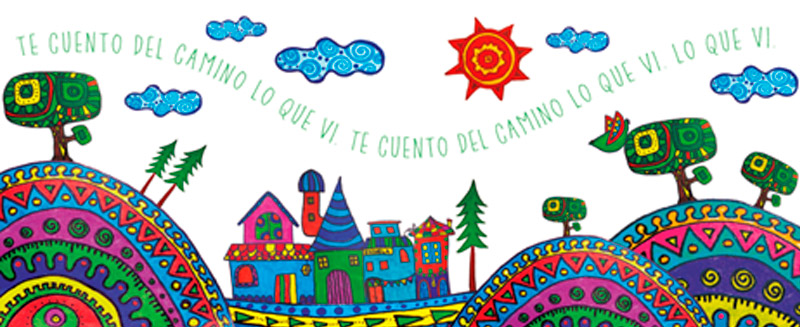The phrase “a quienes llamaban los del camino” echoes with a sense of intrigue and mystery. While its literal translation “to whom the ones on the road called” may seem simple, it shrouds a deeper meaning, hinting at a hidden world of secrets and forgotten narratives. It’s a phrase that has sparked countless conversations, fueling imaginations and prompting endless speculation. What exactly does it signify? What stories lie behind its enigmatic surface?

Image: www.exitopersonal.com
This phrase, often whispered in hushed tones, carries the weight of forgotten history and unspoken truths. It whispers of a time when paths were traversed by wandering souls, each with their own story to tell. These “los del camino,” the ones on the road, bore witness to the world’s happenings, carrying with them tales from distant lands and forgotten cultures. They were the embodiment of a traveler’s spirit, their journeys weaving a tapestry of human experience.
Deciphering the Enigma: Unraveling the Meaning
The phrase “a quienes llamaban los del camino” transcends its literal translation, becoming a symbol of human connection and the shared stories that bind us together. It speaks to the universal human quest for understanding, for meaning, and for a deeper connection with the world around us. It suggests that we are all travelers on our own individual journeys, and that our paths inevitably intersect with those of others.
The “ones on the road,” the travelers, are often depicted as enigmatic figures. They embody a sense of freedom, a thirst for knowledge, and a willingness to embrace the unknown. They are the storytellers, the keepers of ancient wisdom, and the bearers of experiences that transcend the boundaries of time and place.
The Echoes of Past Travelers: The Origins of the Phrase
The origins of the phrase can be traced back to ancient nomadic cultures, where travel was not a leisure activity but a way of life. These nomadic groups wandered vast distances, carrying with them their traditions, beliefs, and stories. They were the original storytellers, passing down their knowledge and experiences through oral traditions.
The “ones on the road” were often seen as intermediaries, bridging the gap between different communities and cultures. They were the catalysts for cultural exchange, spreading ideas and knowledge across vast distances. Their journeys became a testament to the power of human connection and the enduring nature of storytelling.
A Modern Interpretation: The Meaning in Today’s World
In today’s world, the phrase “a quienes llamaban los del camino” resonates with a new level of meaning. We live in a world where technology has compressed the boundaries of time and space, where information readily flows from one corner of the globe to another. We are all connected, intertwined in a global network of communication.
The “ones on the road” in our modern context could be seen as the bloggers, the digital nomads, the travelers who share their experiences through social media. They are the contemporary storytellers, weaving narratives of their journeys, capturing the essence of the places they visit, and sharing their perspectives with the world. Through their digital footprints, they create a sense of shared experience, forging connections between individuals from vastly different walks of life.

Image: www.argentina.gob.ar
Embracing the Mystery: Finding Meaning in Unanswered Questions
The phrase “a quienes llamaban los del camino,” in its enigmatic nature, encourages us to embrace the mystery of life, the beauty of the unknown, and the allure of journeys not yet taken. It invites us to explore the paths less traveled, to embrace the stories that lie waiting to be discovered, and to connect with the world around us on a deeper level.
Tips for Embracing the Traveling Spirit:
Whether you choose to embark on a physical journey or explore the world through stories and online adventures, the spirit of “los del camino” can be embraced in countless ways. Here are a few tips:
- Become a storyteller. Share your experiences, both big and small, with others through writing, photography, or even conversation.
- Embrace new experiences. Step outside your comfort zone and try something new, whether it’s visiting a new place, learning a new skill, or simply trying a different kind of food.
- Connect with others. Seek out conversations with people from different backgrounds and cultures. Learn from their stories and perspectives.
FAQ: Decoding the Mysteries
Q: What is the significance of the phrase “a quienes llamaban los del camino” ?
A: This phrase symbolizes human connection and the shared stories that bind us together. It signifies our universal quest for understanding and our desire to connect with the world around us.
Q: Who were “los del camino”?
A: This phrase refers to the travelers, the wandering souls who carried stories and experiences from different cultures and places, bridging the gap between communities.
Q: How can I embrace the spirit of “los del camino” in my own life?
A: By embracing new experiences, exploring different cultures, becoming a storyteller, and connecting with others, you can cultivate a sense of wanderlust and embrace the journey itself.
A Quienes Llamaban Los Del Camino
Conclusion: Embark on Your Own Journey
The phrase “a quienes llamaban los del camino” serves as a timeless reminder that we are all travelers on our own journeys, seeking meaning, connection, and understanding. It invites us to explore the world around us, embrace the unknown, and cherish the stories we encounter along the way. Do you feel the call of the road, the yearning for discovery? Are you ready to embark on your own journey?






